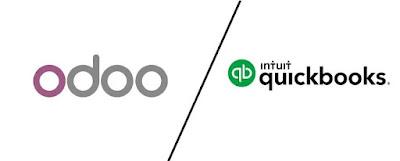
Are you torn between Odoo and QuickBooks for your business accounting needs? Don't worry, we've got you covered! Choosing the right accounting software is crucial for any business, as it can greatly impact your efficiency, accuracy, and overall financial management. In this blog post, we will dive into the world of Odoo and QuickBooks to help you make an informed decision. So sit back, relax, and let's unravel the differences between these two powerhouses in the accounting software arena!
Comparing Odoo vs QuickBooks
When it comes to comparing Odoo vs QuickBooks, it's important to understand the key differences between these two accounting software options.
Odoo is an all-in-one business management platform that offers a wide range of features beyond just accounting. It includes modules for CRM, inventory management, project management, and more. This makes it a comprehensive solution for businesses looking to streamline multiple aspects of their operations.
On the other hand, QuickBooks is primarily focused on providing robust accounting functionalities. It has been around for many years and has established itself as one of the leading accounting software in the market. With its user-friendly interface and extensive reporting capabilities, QuickBooks is often favored by small to medium-sized businesses.
Both Odoo and QuickBooks offer cloud-based solutions, allowing users to access their data anytime, anywhere. However, Odoo also provides an option for on-premises deployment if preferred.
In terms of pricing models, Odoo follows a modular approach where you pay for only the specific modules you need. This allows customization based on your business requirements while keeping costs in check. On the other hand, QuickBooks offers different subscription plans with varying levels of functionality.
When choosing between Odoo and QuickBooks, consider factors such as your business size, industry-specific needs, desired level of integration with other systems or departments within your organization.
Stay tuned as we dive deeper into each platform's pros and cons in order to help you make an informed decision about which accounting software is right for your unique business needs!
What Is Odoo?
Odoo is a powerful and comprehensive business management software that offers a wide range of applications to help businesses streamline their operations. It is an open-source platform, which means it can be customized and tailored to meet the specific needs of any organization.
One of the key features of Odoo is its modular structure, allowing users to select and integrate only the modules they need for their business. From accounting and inventory management to CRM and project management, Odoo has got you covered.
With its user-friendly interface, even non-technical users can easily navigate through the system and perform various tasks efficiently. Plus, it provides real-time reporting and analytics tools to give businesses better insights into their financial performance.
Another great advantage of using Odoo is its ability to automate repetitive tasks, saving time and reducing human error. Whether it's generating invoices or managing payroll, Odoo helps streamline these processes so you can focus on more important aspects of your business.
In addition, being an open-source software means that there are numerous community-driven modules available for customization. This allows businesses to adapt the software as their needs evolve over time without incurring additional costs.
Odoo offers a robust solution for small to mid-sized businesses looking for integrated business management software with customizable options. Its versatility and scalability make it suitable for various industries across different sectors
What Is QuickBooks?
QuickBooks is a popular accounting software designed to help small and medium-sized businesses manage their finances more efficiently. With its user-friendly interface and robust features, QuickBooks has become a go-to solution for many entrepreneurs.
One of the key advantages of QuickBooks is its easy setup process. You don't need to be an accounting expert to start using it. The software guides you step by step, making it accessible even for beginners.
QuickBooks offers a wide range of features that cover various aspects of financial management. From invoicing and expense tracking to payroll management and tax preparation, QuickBooks has got you covered.
Moreover, QuickBooks allows integration with other business tools such as CRM systems or e-commerce platforms, enabling seamless data transfer between different applications.
The cloud-based version of QuickBooks provides additional flexibility by allowing users to access their financial data from anywhere at any time. This makes it convenient for business owners who are always on the go or have remote teams.
QuickBooks is a powerful accounting software that simplifies financial management for businesses of all sizes. Its user-friendly interface, extensive feature set, and accessibility make it an excellent choice for streamlining your company's finances.
The Pro And Cons Odoo Vs QuickBooks
When it comes to choosing the right accounting software for your business, it's important to weigh the pros and cons of different options. In this case, we are comparing Odoo vs QuickBooks. Both platforms offer a range of features that can help streamline your financial processes, but they also have their own set of strengths and weaknesses.
Let's start with Odoo. One of the main advantages of Odoo is its versatility. It is an all-in-one business management suite that includes accounting as just one component. This means that you can integrate your accounting functions with other aspects such as CRM, inventory management, and project management in a single platform. Additionally, Odoo offers extensive customization options which allow you to tailor the software to fit your specific needs.
On the other hand, QuickBooks has been a leading player in the accounting software market for many years. It is known for its user-friendly interface and ease of use. QuickBooks offers a wide range of features suitable for small businesses including invoicing, expense tracking, tax calculations, payroll processing (with additional subscription), and financial reporting.
However, there are some drawbacks to consider as well. While Odoo provides more flexibility in terms of integration with other business functions due to its modular design approach; on the downside it may require more time and effort during implementation compared to QuickBooks' out-of-the-box solution.
Another consideration is cost - while both systems offer different pricing plans depending on your needs; if you're looking for something more budget-friendly upfront without compromising too much functionality or support then QuickBooks might be a better choice.
Ultimately though it will depend on factors such as size and complexity requirements along with industry-specific needs like multi-currency support or international regulations compliance etc., so take into account these points when making your decision regarding which option suits bests for what type(s) company(ies).
Which Accounting Software Is Right For Your Business?
Choosing the right accounting software for your business is a crucial decision that can greatly impact your financial management processes. Both Odoo and QuickBooks are popular choices in the market, each with its own strengths and weaknesses. Let's explore some factors to consider when deciding which software is right for your business.
One important consideration is the size and complexity of your business operations. If you have a small to medium-sized company with relatively simple accounting needs, QuickBooks may be a suitable option. It offers user-friendly features such as invoicing, expense tracking, and basic financial reporting.
On the other hand, if you have a larger organization or require more advanced functionalities like inventory management or project tracking, Odoo might be a better fit. Odoo provides comprehensive modules that integrate various aspects of your business operations into one platform.
Another factor to consider is scalability. As your business grows, it's important to choose an accounting software that can accommodate increasing transaction volumes and expanding requirements. In this regard, both Odoo and QuickBooks offer scalable solutions that can support businesses at different stages of growth.
Integration capabilities are also worth considering when making this decision. If you already use other software systems such as CRM or e-commerce platforms, it's essential to choose an accounting solution that can seamlessly integrate with these tools. Both Odoo and QuickBooks offer integration options but differ in their supported integrations.
Budget plays a significant role in choosing the right accounting software for any business. While pricing varies between the two options based on factors like user licenses or additional modules required, QuickBooks tends to have lower upfront costs compared to Odoo.
Note, there isn't a one-size-fits-all answer when it comes to choosing between Odoo vs QuickBooks for your accounting needs. It ultimately depends on factors such as the size of your business, the complexity of its operations, the need for scalability, integration requirements, and available budget.
By carefully evaluating these aspects and considering your specific business needs, you can make an informed decision on the software that best meets your requirements.
Conclusion
After comparing Odoo and QuickBooks, it's clear that both accounting software options have their strengths and weaknesses.
Odoo offers a comprehensive suite of business management tools, including accounting features, which can be highly beneficial for small to medium-sized businesses looking for an all-in-one solution. It provides flexibility, customization options, and scalability that allows businesses to adapt as they grow.
On the other hand, QuickBooks has established itself as a leading accounting software with its user-friendly interface and robust features specifically designed for financial management. It is widely used by individuals and small businesses due to its ease of use and extensive reporting capabilities.
When deciding between Odoo vs QuickBooks for your business, consider factors such as your specific needs, budget constraints, company size, industry requirements, and technical expertise available within your organization.
If you need more than just accounting functionality or if you prefer open-source software with a wide range of modules suitable for various business operations like CRM or inventory management - then Odoo might be the right choice for you.
However, if simplicity in terms of usability is crucial to you or if you don't require extensive customization options beyond basic financial management functions - then QuickBooks could be the ideal fit for your business.
The decision depends on what aligns best with your unique requirements. Take into account all these factors before making a final decision on which accounting software will propel your business forward efficiently and effectively!
Remember that selecting the right accounting software is not only about meeting current needs but also planning ahead for future growth. So choose wisely!

